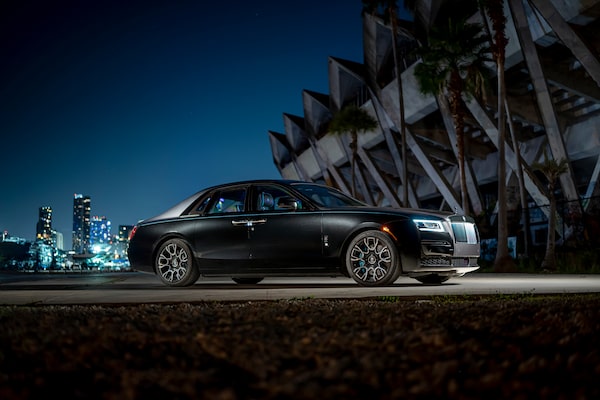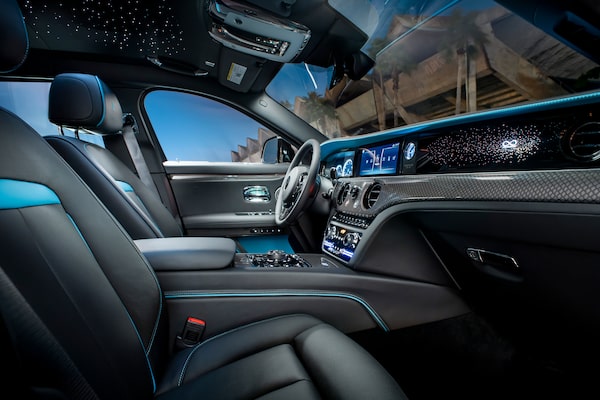
The 2022 Rolls-Royce Ghost Black Badge. The Black Badge sub-brand has been a success, attracting new buyers and boosting profits.JAMES LIPMAN/Courtesy of manufacturer
Rolls-Royce Motor Cars, maker of the most lavish vehicles money can buy, is on track to have its best sales year on record. Not just in Canada, but worldwide.
While some car companies are struggling just to get vehicles on dealer lots due to the semiconductor shortage, Rolls-Royce is on a roll.
The 117-year old British brand, now part of BMW Group, is on pace to sell well over 5,000 vehicles this year, eclipsing its previous record of around 5,100 cars in 2019, says Torsten Müller-Ötvös, CEO of Rolls-Royce. “I’ve never seen all markets in such a fantastic mood.”
Rolls-Royce owes its recent success to a multitude of factors. Chief among them is that the brand wasn’t struck by the semiconductor shortage, Müller-Ötvös says.
BMW Group, like all auto makers, has been using its limited supply of chips on its most popular, most profitable products, which includes Rolls-Royce vehicles, says Sam Abuelsamid, principal analyst at market research firm Guidehouse Insights. “Every Rolls-Royce is probably going to have as much profit margin on it as 20 or 30 mainstream BMW models,” he adds.
Müller-Ötvös also credits his company’s sales boom with a recent change in attitudes among customers, who are making big purchases, not putting things off. It’s yet another example of the pandemic-fueled YOLO economy.
It’s also a sign of the K-shaped economic recovery and its clear winners and losers. Canadians who can afford a super-luxury car have become significantly wealthier over the past 12 months, concentrating pent-up consumer demand at the top of the income spectrum to the benefit of firms such as Rolls-Royce.
For reference, the company’s entry-level Ghost starts at $343,140, while the extended wheelbase Phantom is priced at more than $600,000. Buyers can and do add $100,000 or more on top of that with optional extras and custom features.
It’s not just Rolls-Royce that’s benefitting. Sales at other luxury brands are booming too. Bentley, Rolls’ nearest rival, had a much tougher run in recent years, coming under scrutiny from VW Group management for failing to be consistently profitable. This year, Bentley is on track to post its biggest annual profit on the back of record sales. As of September, Porsche has sold more cars in Canada than it did by this point in 2019, according to data compiled by market research firm MarkLines.
The incoming federal tax on luxury cars – 10 per cent on vehicles over $100,000 – is pushing some wealthy buyers in Canada to make purchases this year, before the tax kicks in. “There have been quite a few people who have made that an express concern in their purchasing process,” says Paul Gilbert, brand manager at Rolls-Royce Toronto. For that reason, the auto maker’s British factory in Goodwood has helped expedite Canadian orders so they arrive before the new tax, he adds.
“This tax coming the beginning of next year might dent [sales] for a little bit, but then it will recover,” says Müller-Ötvös. It’s a pattern he’s seen in countries all over the world when a luxury tax like this is introduced.

Black Badge cars now account for 40 per cent of all sales and carry a premium of roughly US$45,000 dollars above the standard models.JAMES LIPMAN/Courtesy of manufacturer
Further helping Rolls-Royce’s fortunes this year is its fresh lineup of new models in key segments, says Sam Abuelsamid of Guidehouse Insights. The company announced its first electric vehicle – the Spectre – won’t arrive until 2023, but the Cullinan SUV, the new entry-level Ghost sedan and the (relatively) sporty new Ghost Black Badge are all available now.
The Black Badge sub-brand – introduced in 2016 and marketed as a more aggressive alter-ego to Rolls-Royce’s usual straight-laced image – has been a success, attracting new buyers and boosting profits, Müller-Ötvös says. Black Badge cars now account for 40 per cent of all sales and the average age of buyers is 41, according to the company.
“Our customers are younger on average than Mini’s,” adds Müller-Ötvös. Black Badge cars carry a premium of roughly $45,000 U.S. dollars above the standard models, which has “helped a lot to improve profitability,” he explains.
The percentage profit Rolls-Royce makes on each car sold may very well be among the highest, if not the highest, in the entire auto industry, Abuelsamid estimates.
While the pandemic has been a windfall for firms at the top of the luxury car industry, the rest of the market isn’t so hot. According to data compiled by MarkLines, overall sales of new vehicles in Canada are up from 2020′s record low, but remain below pre-pandemic levels, and nowhere near the all-time highs Rolls-Royce is experiencing.
Shopping for a new car? Check out the Globe Drive Build and Price Tool to see the latest discounts, rebates and rates on new cars, trucks and SUVs. Click here to get your price.